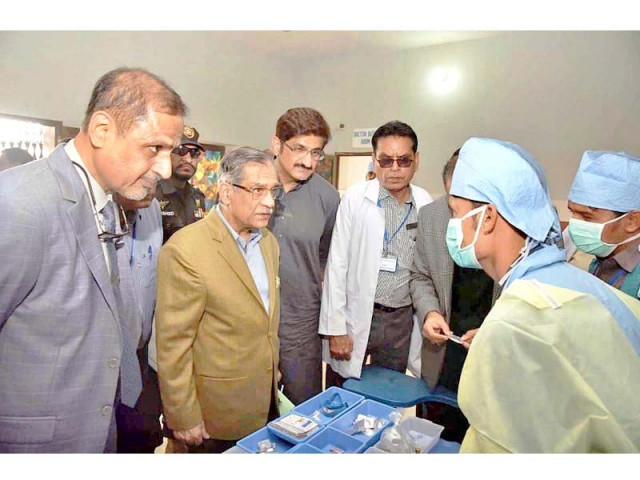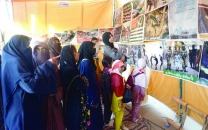Health, education facilities leave much to be desired: CJP
On maiden visit to desert region, Justice Nisar holds govt responsible for lack of amenities

CJP Mian Saqib Nisar inquires from a doctor about the facilities at the Diplo Taluka Hospital. PHOTO: APP
The CJP was accompanied by justices of Sindh High Court, Sindh Chief Minister Syed Murad Ali Shah, provincial ministers and other officials during his visit. After landing at Mai Bakhtawar Airport in Islamkot taluka, Nisar visited the reverse osmosis plants, hospitals and Thar coal project. "The health services which should have been provided in Thar can't be seen," he said. He held the Sindh government responsible for not addressing malnutrition-related deaths of children and shortage of health facilities in Tharparkar, pointing out that the health sector has been devolved to provinces after the 18th Constitutional Amendment.
Absence of doctors
The CJP referred to the absence of surgeons and radiologists at the hospital which reflected the state of health affairs in Tharparkar. "I found it strange when I saw an x-ray machine kept idle for 10 years," he told. "There's an operation theatre but the surgeons aren't available."
Justice Nisar said the CM had himself witnessed the situation and expressed the hope that he would take immediate measures to resolve the issues. The CJP said he was briefed that the Sindh government distributed subsidised wheat among the residents of Tharparkar as a drought relief measure.
Thar coal project: ‘Utilise coal royalty for development in Tharparkar’
The CJP visited a girls' primary school in Diplo taluka where he was dismayed to notice unavailability of water and lack of sanitation in the toilets. He also went to Misri Shah Reverse Osmosis plant in Mithi taluka. The provincial government claims that it is Asia's largest RO plant, which processes 2 million gallons of water per day, supplied for 50,000 people. The plant was inaugurated in 2015.
Civil Hospital
During the visit to Civil Hospital Mithi, the CJP interacted with patients, attendants and visitors who complained about lack of health facilities and water shortage. He also received written complaints from the people.
The hospital's emergency room drew the ire of the CJP, who wondered how the doctors would cope with an emergency. "You can't call it an emergency ward by making just a few medicines available."
CJP reaches Tharparkar on day-long visit
Thar coal
During his visit to Thar Coal Block II, the CJP saw the open-pit coal mine and witnessed the Thari women driving 60-ton dumper trucks. He spoke with the female drivers and called them proud daughters of Pakistan. Sindh Engro Coal Mining Company's chief executive Syed Abul Fazal gave a presentation about the mining project while Engro Powergen Thar Limited chairman Ahsan Zafar Syed briefed about the progress on the 660 megawatt power plant.
Justice Nisar was informed that the project's welfare arm, Thar Foundation, was striving to make Islamkot taluka UN Sustainable Development Goals (SDGs) compliant by 2024.
He was also briefed about bio-saline agriculture, 24 schools being run by the foundation as well as the two hospitals, six RO Plants and an under-construction 82-bed hospital being built at a cost of Rs2 billion. The CJP was taken to the-newly established village where 172 houses have been built for the families being relocated due to the coal project.
Published in The Express Tribune, December 13th, 2018.



















COMMENTS
Comments are moderated and generally will be posted if they are on-topic and not abusive.
For more information, please see our Comments FAQ